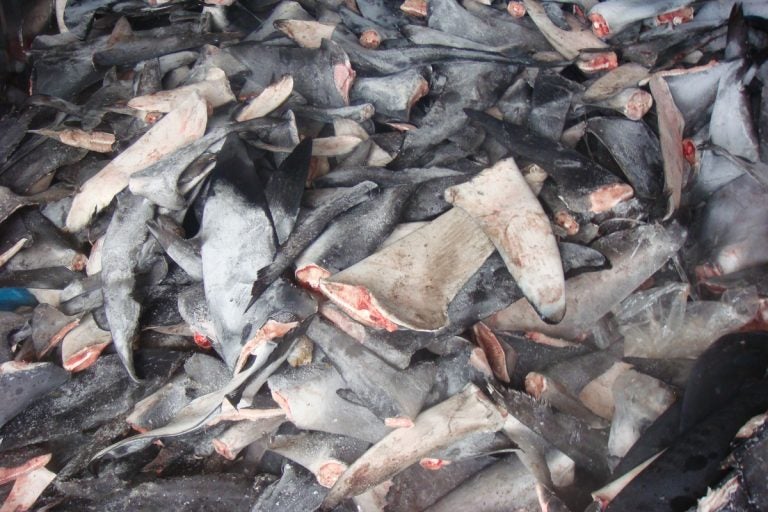From soup on the table to a bill in congress: a look inside the shark fin debate
Shark fin is the main ingredient in a much-prized soup. Fishermen commonly cut off the fins and throw the rest of the shark overboard to drown.
Listen 0:00
A pile of shark fins. (Courtesy of Oceana/Ricardo Roberto Fernandez Martinez)
In Chinese culture, shark fin soup is a delicacy and status symbol, often served during banquets.
Sometimes, at Chinese restaurants in the United States, the soup is listed on the menu. Other times, you can only get a bowl if you make a special request.
That’s because the soup is a hotly debated item in both the scientific and political communities. Shark fin soup is illegal in 12 states, including Hawaii, Illinois, and Texas.
Now, Congress is once again considering a ban on the shark fin trade.
Two bipartisan bills in Congress, one in the House and one in the Senate, would make it illegal to possess, buy, sell, or transport shark fins in the United States.
The Senate bill explains that many shark populations are in peril worldwide, and that some fishermen harvest shark fins by finning, a “cruel practice in which the fins of a shark are cut off” on a ship at sea, and the rest of the animal is “then thrown back into the water to drown, starve, or die a slow death.”

The bill would impose a federal shark fin ban. A 2013 study in the journal Marine Policy estimates that between 63 and 273 million sharks are killed each year, including those killed for their fins.
But, not all scientists agree that banning shark fin would be the best way to protect sharks. Last month, two marine biologists wrote in the journal Marine Policy that a shark fin ban would not prevent sharks from being killed worldwide. They write that, while protecting sharks is “laudable and necessary,” a ban is “misguided” because the U.S. has well-managed and sustainable shark fisheries. They say a ban would not only undermine that progress, but also tell trading partners that the U.S. “will not support their shark conservation efforts regardless of future improvements to their fisheries’ sustainability.”
Several conservation groups responded to the article in Marine Policy, saying that the ban does not target shark fisheries in the U.S., only shark fins, and that, if any fisheries closed because of the ban, it would be because the fisheries are catching sharks primarily for their fins — which is precisely the problem. The conservation groups supporting the ban also say that, if the U.S. allows shark fins imports from countries that don’t have sustainable practices, such as Myanmar and China, then it is “complicit in the catch of at-risk species and condoning their lack of finning regulations.”
Shelley Clarke is a fisheries management scientist who has studied the shark fin trade in Hong Kong and who works with the United Nations’ Food and Agriculture Organization. She’s skeptical of the bill.
“I would rather focus on the point of the kill, which is on the water, determining what the fishermen do with the sharks that are caught on their fishing lines, and making sure that the number of sharks that are killed every year in fisheries is at a sustainable level,” she says.
Clarke says the major threat to sharks is commercial fishermen.
“Some of those [fishermen] are trying to catch sharks … some of those are happy to catch sharks even though they’re catching something else, and some of them are completely catching sharks by accident, and they’re not allowed to to even utilize those products,” she says.
Clarke works with tuna fisheries to gather better data on how many sharks are caught, which species are most at risk, and how to manage populations through measures like catch limits.
“Most fisheries around the world (including ours) on the high seas, do not have catch limits for sharks. I think at some point we’re going to need to draw a line in the sand and say, You can’t catch any more sharks than this because we don’t believe the populations can keep pace with that,” she says.
This is not the first time that U.S. politicians have proposed a federal shark fin ban. House and Senate politicians introduced similar bills last year, but they didn’t make it out of committee.
But, with or without a ban, the shark fin trade is being pressured worldwide, as reported by the South China Morning Post in Hong Kong. The city is a global hub for the shark fin trade, and its flagship airlines and a container shipping giant banned shark fins in their cargo last year under sustained public pressure. This year, China’s biggest airline did the same.
WHYY is your source for fact-based, in-depth journalism and information. As a nonprofit organization, we rely on financial support from readers like you. Please give today.






